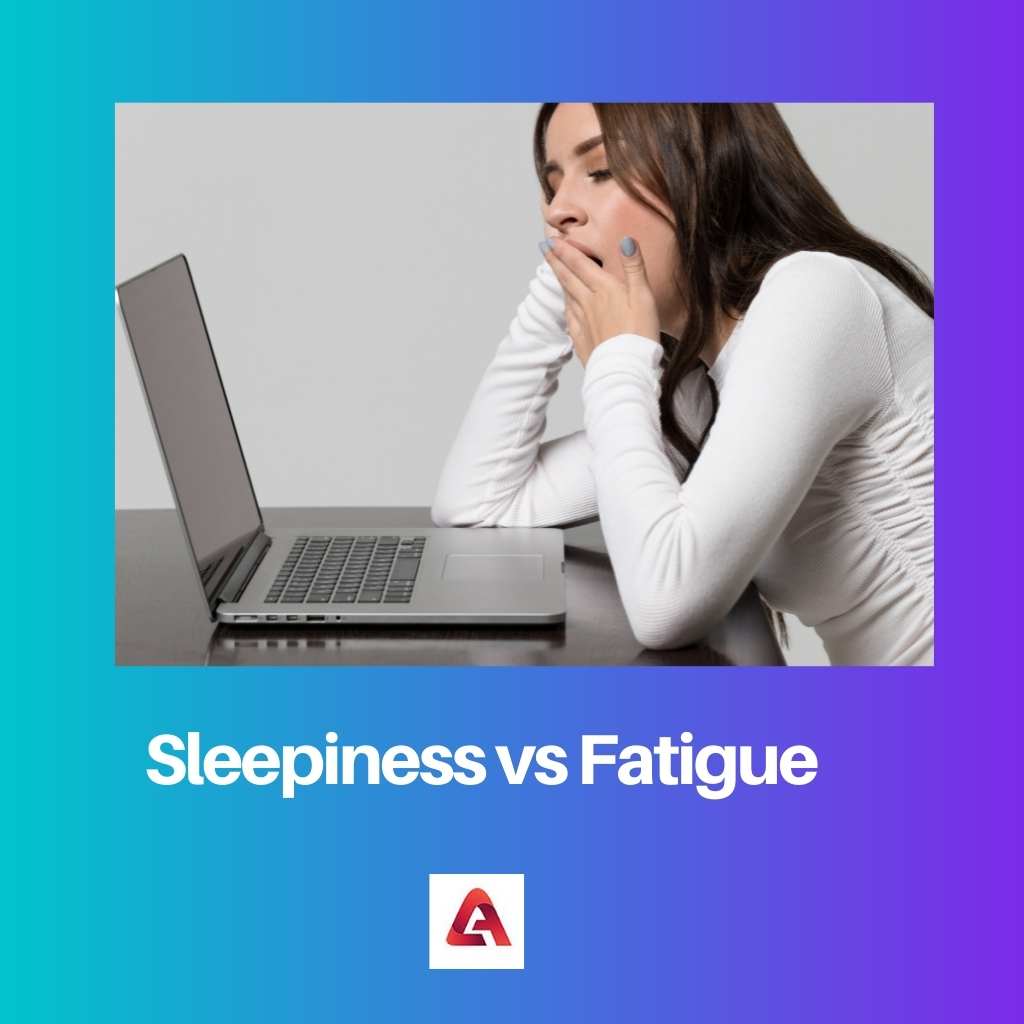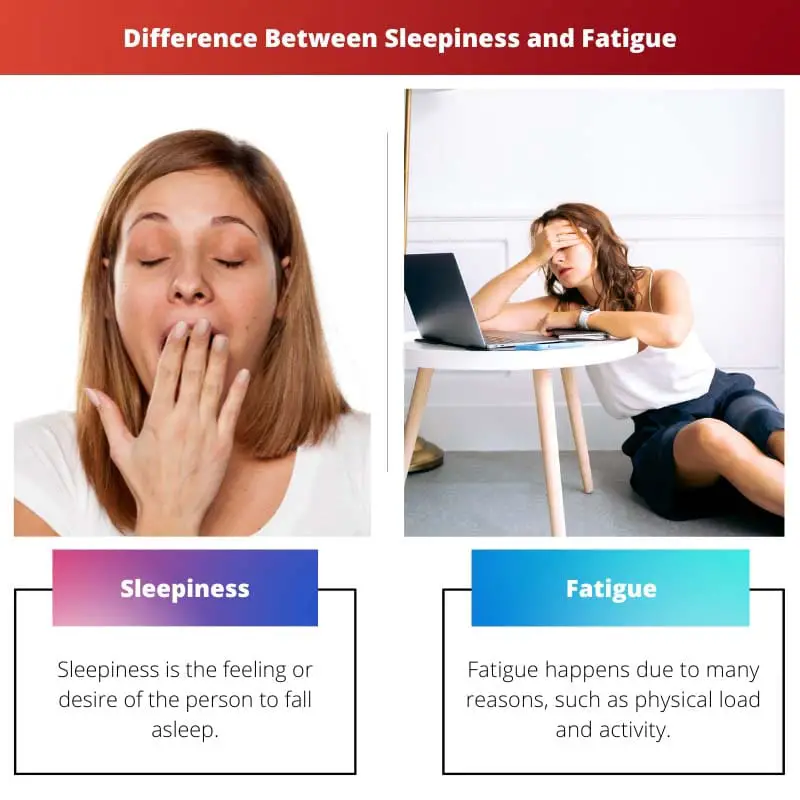Sleepiness and fatigue are two different words with deep meanings. Many people use sleepiness and fatigue interchangeably. People need to know the difference between sleepiness and fatigue to find any hidden health conditions or for general knowledge.
The meaning of fatigue is deeper than sleepiness. The outcomes of sleepiness and fatigue are different as well. Sleepiness is the result of brain activities, whereas fatigue is the outcome of physical activities.
Key Takeaways
- Sleepiness results from a lack of sleep or disrupted sleep patterns, while fatigue stems from mental or physical exertion.
- Sleepiness can be alleviated by napping or sleeping, whereas fatigue may require rest, stress management, or addressing underlying health issues.
- Sleepiness primarily affects alertness and focus, while fatigue impacts overall energy levels and the ability to perform tasks.
Sleepiness vs Fatigue
Sleepiness is a normal activity of the human body when a person gets tired from routine work. A person can take some sleep to become active. A person can feel sleepiness due to multiple reasons. A person can also feel sleepy while reading a boring book. Fatigue can be a reason for extra physical or mental work. Fatigue can cause tension. Physical health problems can also cause fatigue.

Sleepiness is the feeling or desire of the person to fall asleep. Sleepiness can happen due to many reasons. The common reasons for sleepiness are regular habits and a comfortable environment.
The main reason for feeling sleepy is the adenosine chemical build-up in your mind. This chemical brings the sign that the person needs to sleep. Sleepiness may not contain any stress or tension in your body and mind.
Fatigue happens due to many reasons, such as physical load and activity. People who work hard daily may get exhausted frequently.
Fatigue happens due to stress and tension in your bones and muscles. Fatigue can also happen due to underlying physical health problems. Fatigue is not a feeling of sleepiness but tiredness and exhaustion.
Comparison Table
| Parameters of Comparison | Sleepiness | Fatigue |
|---|---|---|
| Meaning | The person feels asleep | The person feels exhausted |
| Results | Sleep cycles | Exhaustion, tiredness, physical pain, and mental stress |
| Reasons | Normal habits, Low energy | Health problems, chronic fatigue syndrome |
| Habits | It May happen due to habits. | Never happens due to habits |
| Severity | Sleepiness has no severe repercussion as it is a normal process | Fatigue may become severe if happens without any normal reasons |
What is Sleepiness?
Sleepiness doesn’t have any repercussions for your body and mind. People may feel sleepy without any particular reason. Generally, when you feel sleepy, your eyes get tired and need some rest.
Some people feel sleepy when they are not doing anything. Sleepiness may result in taking a nap or sleeping for a few hours.
Most of the time, you will feel sleepy at night due to regular habits. Sometimes, the effects of medications (or antibiotics) may bring the symptoms of sleepiness.
A person with a desire to fall sleepy may not have any tension in the bones or muscles. Some people sleep due to working for long hours. Sleepiness is a sign that your body needs rest to wake up energetic the next morning.
The amount of adenosine decides the time when the person feels sleepy. The most common symptoms of sleepiness are tired eyes and heavy eyelids.
After the person sleeps, the whole body and mind enter the rest or silent zone. The person may not hear any noise or sound after falling asleep.
Sometimes, fatigue may call for sleepiness, but sleepiness never results in fatigue. Feeling sleepy is very common for people due to tiring schedules.
The feeling of sleepiness varies for everyone as it depends on the health condition and age of the person.

What is Fatigue?
Fatigue is a common result of heavy physical or mental activity. Fatigue may cause a feeling of sleepiness. Fatigue has nothing to do with regular habits.
For example, if someone is doing physical activity for long hours, fatigue is common after a heavy workload. Sometimes, fatigue is linked with severe illness and health disorders.
Fatigue happens due to stress and tension in the bones and muscles. Fatigue reduces the energy level in the body of humans. The person would not feel like doing any activity after getting fatigued or exhausted.
People that feel fatigued should give their body rest for some time. The body needs some time to get active and increase its energy level.
Fatigue can be treated with energy drinks, caffeine intake, and rest. The fatigue level of people depends on their energy level and health condition.
People that are physically fit may not get fatigued easily. Anybody with low physical fitness would get fatigued frequently. People may sleep after getting fatigued to reduce the tension produced in the bones and muscles.
Anybody who has fatigue or exhaustion may not require sleep as they can take a rest and work again. Fatigue doesn’t mean sleeping or taking a nap, but giving rest to your body.

Main Differences Between Sleepiness and Fatigue
- Sleepiness is a feeling of sleeping for some time. On the other hand, fatigue is a feeling of tiredness and exhaustion.
- Sleepiness is not due to stress and tension in your body and mind. On the other hand, fatigue may happen due to stress and tension.
- Sleepiness can be a result of regular habits, whereas fatigue happens due to excess physical or mental activities.
- Sleepiness results in falling asleep, whereas fatigue may not call for a perfect sleeping period.
- Sleepiness is not a chronic problem; fatigue may become chronic due to health problems.
